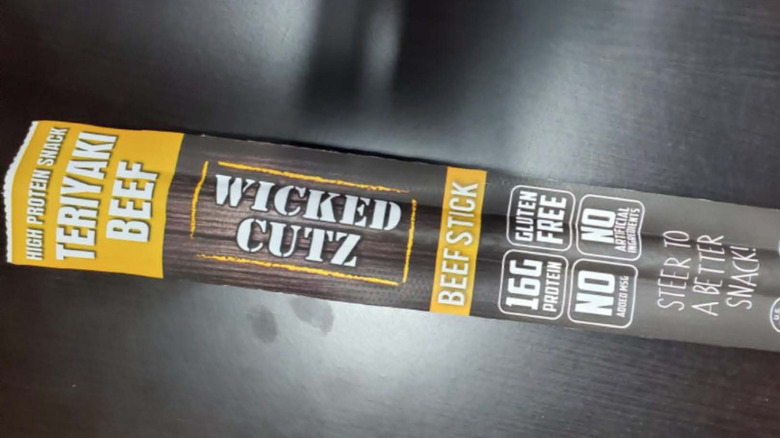The Real Reason Nearly 5,800 Pounds Of Beef Sticks Were Just Recalled
Labels matter, particularly where food products are concerned, since the presence of ingredients like nuts, wheat, dairy, and eggs could have serious, unintended consequences for a consumer with food allergies or sensitivities. This explains why Frickenschmidt Foods has ordered the recall of 5,795 pounds of ready-to-eat beef stick products, under its "Wicked Cutz" label, per the USDA's Food Safety and Inspection Service.
The items, which were sold as "High Protein Snack Teriyaki Beef" were labelled as gluten-free, despite wheat being listed as an ingredient on the snack's label. The products carry the number M33928, which can be found on the back of the package, and they were sent to retail stores across the U.S. The items carry lot codes 113022, 120122, or 012823.
While no one has reportedly gotten ill after consuming the beef sticks, the FSIS says those who have bought the items should either return them to the place where they were purchased or throw the mislabeled beef sticks away.
More recalls aren't necessarily a bad sign
While food recalls might sound like scary business, and it might seem like there are more of them happening every year, food safety experts say that's not necessarily a bad thing. Linda Harris, former chair of the UC Davis food science and technology department, told UCDavis Magazine in 2019 that the number of food recalls is trending upward "because we are better at detecting outbreaks."
"We can detect them faster, more accurately, and therefore, especially with perishable products, there's a greater chance the product is still in the marketplace when we discover there is something to recall," she said.
In most food recall cases the USDA says, "with the exception of nut products, the most common reason for initiating the recall was failure to declare major allergens." Between 2004 and 2013, data from the U.S. Department of Agriculture shows nearly 12% of all recalls involved prepared foods (excluding soup); nuts, seeds, and nut products made up nearly 11%, while baked items made up 9%. From the prepared foods recalled in the time period, 42% were due to undeclared allergens, 26% listeria concerns, and 10% salmonella.
While these numbers might seem concerning, experts say it's all in the details. Harris explained: "If it's [announced] before people get sick, it means that at least the mechanisms are in place [to catch the issue]." As stated above, so far there have been no reports of illness from the recalled beef sticks — meaning the system appears to be working.

